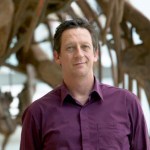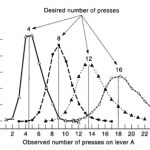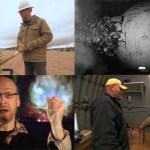science communication
A fun talk about sex, death and evolution at LA's Natural History Museum. It's free and ticketless -- so please bring friends and colleagues!
WHEN: Thursday, December 2, 6-7:30pm.
WHERE: LA Natural History Museum in the Times Mirror Room.
WHAT: Australian paleontologist John A. Long is the recently appointed vice president of research and collections at the Natural History Museum of Los Angeles County. Long has been actively engaged in research on the early evolution of fish and dinosaurs. In 2001 Dr. Long won the Eureka Prize for the Public Promotion of Science.
This is how Caltech…
The second edition of the Rock Stars of Science is now out online, and in the November 23rd ("Men of the Year") edition of GQ magazine. As Chris Mooney notes, this is a campaign funded by the Geoffery Beene Foundation, working to raise recognition of scientists' work (and scientists, period, since roughly half of the American population can't name a single living scientist). Part of the campaign is to make science noticeable and "cool;" I'll quote from the press release:
ROCK S.O.S⢠aims to bridge a serious recognition gap for science, observes journalist Chris Mooney, co-author of the…
This week marked the release of Brian Switek's (blog, twitter) first book, Written in Stone. I got my hands on a review copy a few weeks ago, and I have nothing but good things to say about it. (Disclaimer: I was provided with a free review copy of the book, without any expectation that I'd review it on my blog or elsewhere.)
Written in Stone is a highly-accessible, engaging book which takes the reader simultaneously through the story of vertebrate evolution and the story of the scientists who - quite literally - uncovered it. The book's main success might be in its seamless transition back…
"When men wish to construct or support a theory, how they torture facts into their service!"
Even in 1852, psychologists like Charles Mackay, who wrote those words in his book Extraordinary Popular Delusions and the Madness of Crowds, were well aware of the dangers of confirmation bias.
I was reminded of the pervasiveness of this cognitive bias last weekend during a visit to GlaxoSmithKline's vaccine distribution facility in Marietta, Pennsylvania. Confirmation bias is as dangerous in 2010 as it was in 1852.
I was invited by David Wescott to join a group of bloggers for an event at GSK's…
As I'm sure many of you did, I recorded Phil Plait's (twitter, blog) Bad Universe pilot last week, and it was so good that I watched it twice. And then two more times as I tried to figure out why it was so compelling. Why am so interested in picking apart these particular 44 minutes of TV awesomeness? Because at the end of the day, effective science teaching isn't so different from effective science programming, even down to the timing. In an hour of TV, you get about 44 minutes of programming. Likewise, in an hour-long lecture, you can probably only use about 75% of that time, about 44…
The universe is expanding, and so is the science blogosphere.
Directly on the heels of the announcement last week of the big daddy meta-aggregator to end all aggregators, scienceblogging.org, there are not-one-but-two new science blogging networks that have launched in the last forty-eight hours.
Before I get to the networks, my Scibling (once a scibling, always a scibling) Abel Pharmboy aka David Kroll has moved Terra Sig over to CENtral Science. Go say hello at his new digs.
Yesterday, The Guardian, a legacy media institution, launched a small but impressive science blogging network, that…
There's been lots of talk lately about the future of science blogging, in general, and the purpose and nature of blogging communities or networks, more specifically. If you haven't read Bora's post, you should. Even if you aren't specifically interested in SCIENCE blogging, as it relates to new media in general.
From the outset I will state that I still am unsure about my future at scienceblogs. When I do make a decision, it will be carefully considered, and I will be confident in my decision. I have not been around long enough to feel fed-up with things here. Though I can also see that those…
This is to note that u n d e r v e r s e, the blog that uses nineteenth century German emphatic spacing, has been added to my blogroll (I hope - I'm not good that these customisation things), wherein you can read deep, intelligent and Chamberlainist musings by Chris Schoen. Highly recommended.
Although Sunday Night did a very good story on the antivaccination campaign's cost in lives, it now looks like they will do a follow up that takes the antivaxxer line, if the appearance in the ads of Australia's least accurate journalist Mike Munro is any guide. Munro is a gutter journalist of UK proportions. His guiding principle is that if it doesn't have drama, then the truth has to go to create some. We'll see...
Wilkins is fragile and destablised
Intellectual tourist attacks local inhabitants
All happy bacteria are alike (or is that like each other?)
Australian current affairs gets vaccination right! [That's not a pun, it's an act of God] The original video is here.
Evolution does spreadsheets in origin of genetic code
Siris and Sandwalk go head to head on the Courtier's Reply. Neither of them are dressed.
Creationists misunderstand Deep Time. I'm shocked. I mean, it's only ten years since they were taken to task for it. Perhaps if they had millions of years to think it over...
A dozen or so years ago, or maybe more, I was heading up the communications section of The Walter and Eliza Hall Institute of Medical Research in Melbourne, when I employed a young biology graduate as a graphics guy to do medical graphics. This he did for a while, until he started playing with three-dimensional graphics software. He did some animations of cell surface signalling molecules, and of malaria parasites, and cancer cells, and took them to the director, and suggested that we set up an animation unit within the department.
This we did, and within a short while, Drew Berry had managed…
I can't say enough about ScienceOnline09, and about how useful meetings like this can be. When you toss a bunch of smart people from various disciplines together, add a little ethanol, and shake vigorously, you get some interesting results.
I had the chance to chat a bit with Dave Munger (hi Dave, hi Greta---great to meet you guys!) who put together researchblogging.org, an aggregator of blog posts on peer-reviewed research. It's a great tool. Let's say you want to blog about a cool journal article. You can shoot over to researchblogging.org, generate a citation, and place a badge on…
I thought I'd mention the upcoming Science Blog writing discussion that is scheduled for Tuesday, 1 October, at Manhattan's Apple Store in Soho. This isa panel that will discuss the value of a blog to communicating with the public about one's research. The panel will be moderated by Katherine Sharpe and, along with me, includes several of my SciBlings, Jake Young, Jessica Palmer, Steinn Sigurdsson, and Brian Switek.
What: Apple Pro Session panel with ScienceBloggers
Date: Wednesday, 1 October 2008
Time: 7 - 8pm ET
Location: 103 Prince Street [map].
You might also wish to refer to several…
Last night we went to a pub to hear about some new technology for diagnostic testing. A wonderful speaker, Karen Hedine from Micronics came and told us about the work that her company is doing. She brought along a demonstration machine and passed the machine and several plastic test chambers around the pub so we could all take a look.
The technology, microfluidics, is fascinating stuff. I've written about it a little before( "From Louis Pasteur to "Lab on a chip"").
A biological sample (blood, poop, urine, saliva, a vaginal smear) is drawn into the card. Molecules move into the card via…
A few weeks ago I had the pleasure of attending one of the Science Communication Consortium's (SCC) panel discussions on communicating science (moderated by blogger Kate of The Anterior Commissure), and for those who missed the last one another discussion is fast approaching. On November 15th the SCC will host Dr. Lee Silver (Princeton - Molecular Biology), Dr. Gavin Schmidt (Goddard Institute for Space Studies - Climatology), and Dr. Wendy Chung (Columbia - Clinical and Molecular Genetics) at Rockefellar University in NYC to present their ideas on effectively communicating controversial…
On October 18th (next Thursday) the NYAS Science Allicance will be presenting a panel discussion entitled "How Various Media Outlets are Used to Popularize, Communicate & Promote Science" at NYU. Christopher Mims (Scientific American), Ann Marie Cunningham (NPR's Talk of the Nation: Science Friday), Kitta MacPherson (the Star Ledger's Science section), and David Levine (Office of Communications and Marketing for the New York City Health and Hospitals Corporation) will be the panelists, although I'm a bit disappointed to see that blogs aren't being represented on the panel and science…



